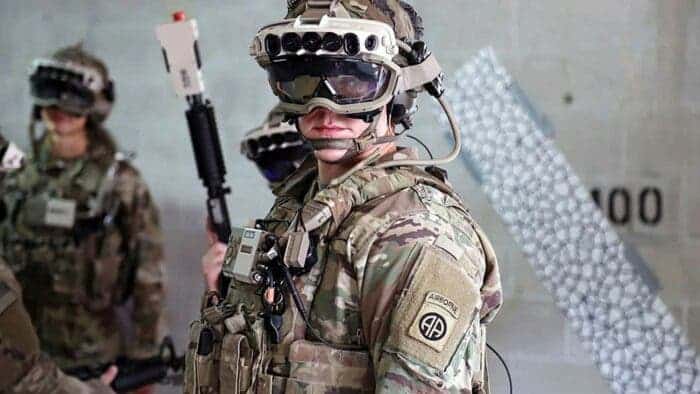According to Bloomberg, the U.S. Army placed an order with Microsoft for another batch of advanced AR glasses for combat use. Microsoft sent 20 sets of updated prototype glasses to the U.S. military at the end of July. They were tested by two squads of soldiers in August. They praised the design improvements of the glasses: mainly that they no longer felt nausea and pain when wearing them.

Last year, Microsoft worked with the U.S. Army to develop HoloLens-like mixed reality glasses called the Integrated Vision Augmentation System (IVAS). They are intended to provide soldiers with live information on navigation and commands. This is possible via a head-up display, as well as offering thermal and night-vision views. The devices, using what is called the Integrated Visual Augmentation System (IVAS), will allow soldiers to see through smoke and around corners. It uses holographic imagery for training and has 3D terrain maps projected onto their field of vision at the click of a button.
However, the reports in early 2022 show that the glasses were causing headaches, nausea, and eye strain to soldiers in tests. The glasses in question are part of an order for 5,000 sets that the Army will begin receiving in September 2022.
Microsoft AR glasses are now more reliable
US military spokesman David Patterson said that the new glasses are now available in version 1.2. According to him, the new batch “has been improved in terms of reliability, low-light sensor performance and appearance size”. The Army awarded Microsoft another contract for a new system on Sept. 5. The U.S. Army is also checking if the company can expand production. This means that it is gearing up to place more orders if the company can handle it.
The Army asked Congress to fund the purchase of 6,900 glasses from Microsoft but was rejected earlier this year. Instead, Congress reduced the Army’s $400 million request to just $40 million to improve the system. The Army provided Microsoft with the funding and an additional $125 million to continue development.
The U.S. Army plans to spend up to $21.9 billion on the project, and the glasses will be tested by the Army in 2025 for combat use. Microsoft’s HoloLens technology continues to live on in these special military glasses. The use cases for these glasses at home and in the workplace appear to have disappeared with layoffs affecting the teams involved in January.
Significance of the Contract
The US Army’s decision to award Microsoft with another contract for the IVAS goggles is a huge validation of Microsoft’s AR strategy and the feasibility of AR tech in general. The contract is also a testament to the potential of AR technology in the military. It provides soldiers with enhanced situational awareness, enabling information sharing and decision-making in a variety of scenarios[3].
Conclusion
The U.S. Army is really serious about the use of Microsoft’s AR glasses for combat. After the initial testing which got a poor review, they provided funding and Microsoft was able to upgrade the device to an acceptable level. Though the regular home use of these glasses appears to have disappeared, the Army is now a new market for them.
The US Army has ordered more Microsoft AR glasses, which are designed to provide soldiers with live information. It gives info on navigation and commands via a head-up display. It also offers thermal and night-vision views. Although the AR glasses initially caused nausea and headaches among soldiers, modifications have been made. They are now combat-ready. The Army made a tough decision to award Microsoft another contract for the IVAS googles. This is huge validation of Microsoft’s AR strategy and the feasibility of AR tech in general.


